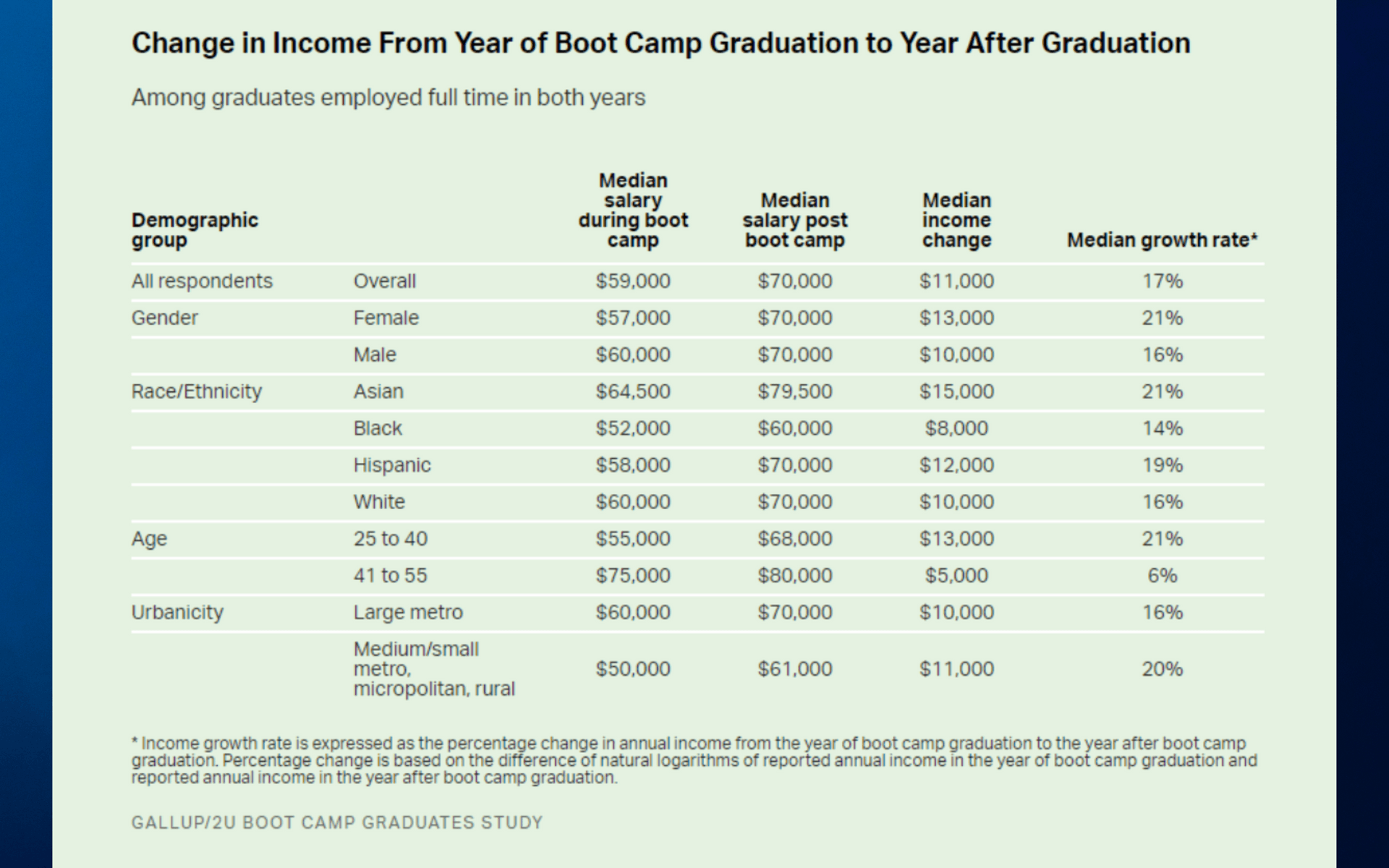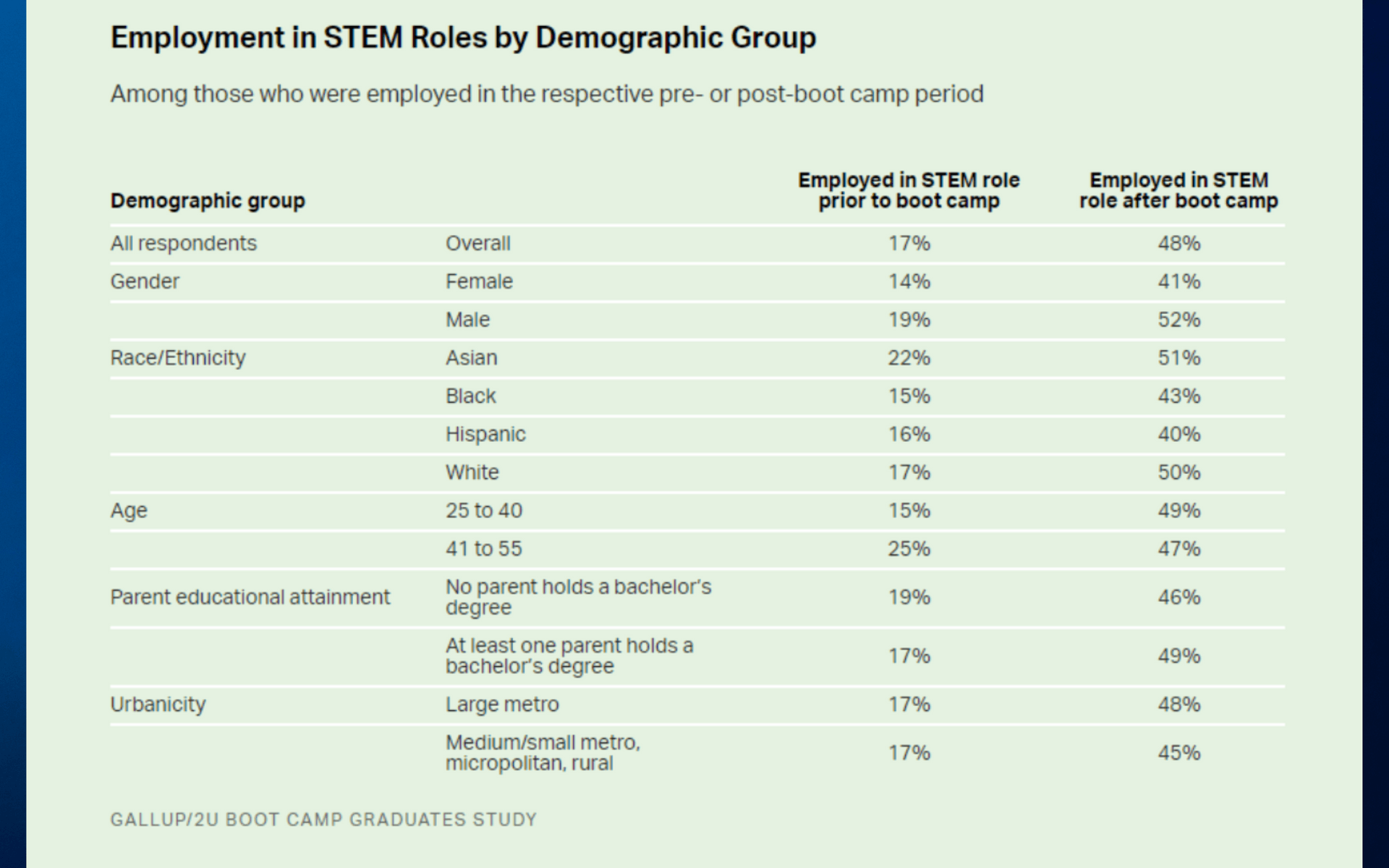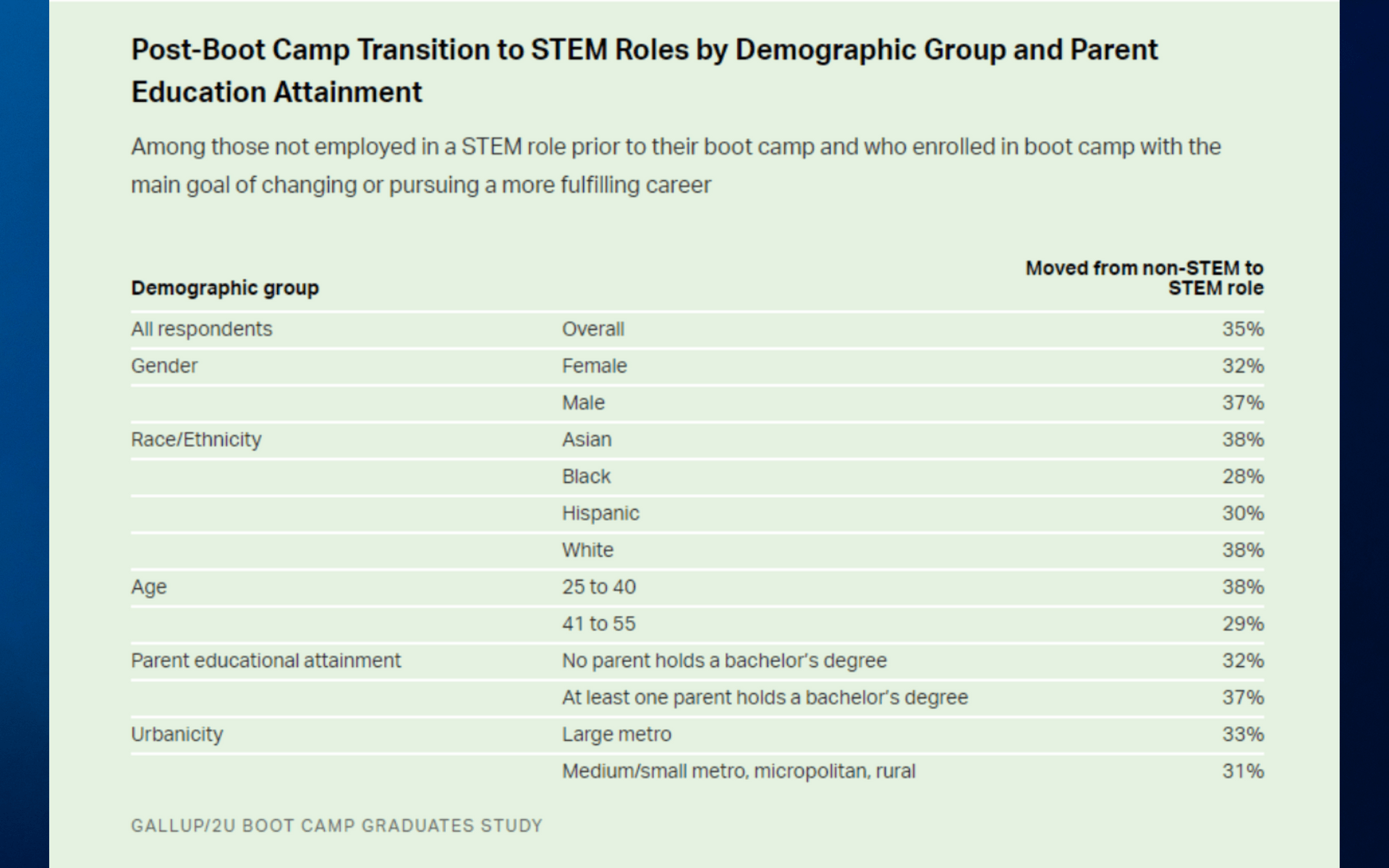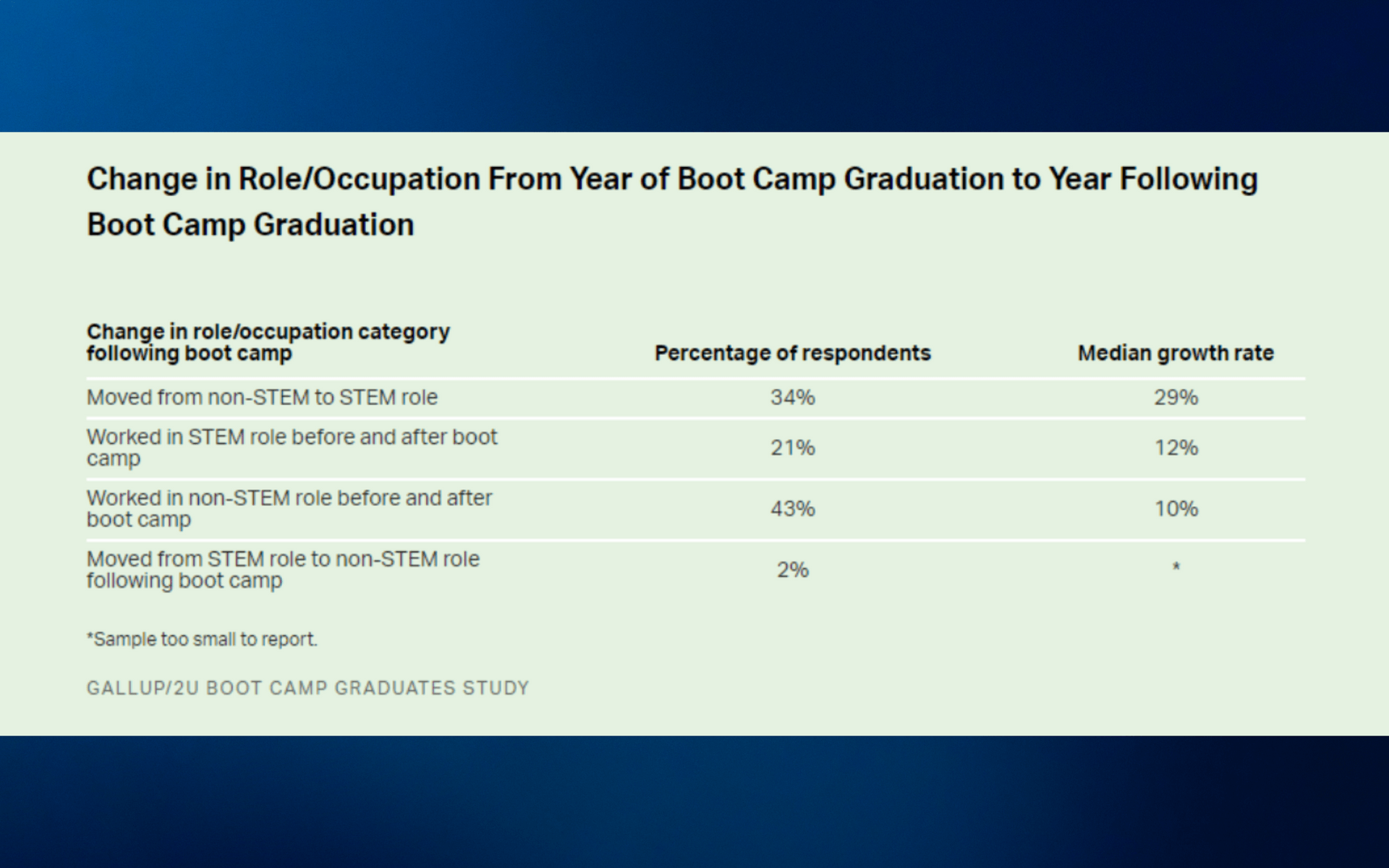Insights
Tech Boot Camps Linked to Higher Pay, STEM Jobs for All Grads
Written by Gallup on May 10, 2022
Related content: Boot Camps, Impact and Outcomes

This article was originally published by Gallup. It is the second in a series that details the major findings from the recent Gallup-2U Boot Camp Graduates Study, which surveyed 3,824 adults in the U.S. who graduated from a 2U-powered boot camp program between 2016 and 2021. To learn more about the results of this study, read the first article of the series.
Workforce development programs such as boot camps and career pathways training programs are designed to help workers quickly gain the in-demand skills and credentials they need to transition into high-demand, higher-wage jobs in specific sectors or grow within their current roles or companies.
But there is little research on how effective these types of programs are, specifically for people of color. In fact, a Joint Center for Political and Economic Studies analysis released just this year found less than a handful of evaluations of career pathway training programs report on trainee outcomes by race.
Drawing from interviews with 3,824 graduates of 2U-powered university boot camps, a new study by Gallup and educational technology company 2U looks at how effective tech boot camp programs are for graduates from various backgrounds, including populations traditionally underrepresented in technology jobs, such as people of color and women.
Salaries Rose After Graduation
Although it may not have been the main driver of why they enrolled in boot camps, all boot camp graduates surveyed reported making more money shortly after graduation than they were earning before -- regardless of their race or ethnicity, gender, age and whether they live in urban or rural areas.
One year after graduation, the median salary for all boot camp graduates surveyed was $11,000 higher than what they reported making the year they graduated. And the median income growth in the year following boot camp graduation was 17%. Median pay increased across all groups of boot camp graduates surveyed, regardless of race, gender, age and urbanicity, with growth ranging from 6% to 21%.

STEM Jobs Nearly Tripled Before and After Boot Camp
Computer science-related jobs are some of the fastest-growing occupations in the U.S. job market. But despite efforts over the years to increase diversity in the science, technology, engineering and math (STEM) workforce, Black, Hispanic and female workers remain underrepresented, particularly in computing jobs.
Boot camps could potentially bridge some of these gaps. About one in six (17%) boot camp graduates were employed in a STEM occupation at the time they enrolled in their boot camp. One year after graduation, this percentage nearly tripled to 48%.
Further, the percentages of boot camp graduates employed in STEM jobs after graduation at least doubled across all demographics -- notably nearly tripling among female graduates (14% to 41%) and Black graduates (15% to 43%). Similar increases were evident too among graduates regardless of whether one of their parents had a bachelor's degree. Nearly half of respondents in both groups were employed in a STEM role after boot camp.

It is worth noting that not all boot camp graduates enrolled in their program to transition into a STEM career. For example, some may have wanted to incorporate UX/UI knowledge into their role as a graphic designer, and still others may have enrolled for personal interest or development. When limiting analysis only to those who explicitly stated they wanted to change careers after their boot camp, the percentage of students who successfully make that transition is even higher.
Nearly four in 10 Asian and White graduates who enrolled in their boot camps with the goal of changing careers -- but were not employed in STEM jobs prior to boot camp -- have transitioned to a STEM role following graduation. This percentage (38%) is slightly higher than the 28% of Black graduates and 30% of Hispanic graduates who said the same.

Graduates Who Moved From Non-STEM to STEM Jobs Saw Most Income Growth
Most STEM jobs command higher salaries than non-STEM jobs. For example, the median annual wage for computer and technology occupations in May 2021 was $97,430, which was considerably higher than the median annual wage for all occupations of $45,760.
Consistent with these income figures, boot camp graduates who moved from a non-STEM job to a STEM job after graduation saw the most substantial income growth. The median income growth rate for those moving from a non-STEM role to a STEM role was 29%, compared with roughly 10% among those who did not change from a non-STEM role to a STEM role.

Implications
Graduates of 2U-powered boot camp programs reported earning substantially more money just one year after graduation, regardless of race, gender, age or where they live. These graduates were also finding new jobs after graduation -- many of them in STEM fields -- which suggests boot camps could play an important role in filling in-demand tech jobs and significantly increase the earnings of people who do move to that field.
One employer who participated in a qualitative study for 2U said their industry needs a more diverse talent base to better serve their clients and existing employees. "As we build certain technologies that affect everyone, we need to have an engineering base that reflects the patients that we serve," the employer said. "And without bringing in more diverse individuals, we risk losing the ones that we already have."
Although the survey of 2U boot camp graduates is limited to only one provider, it suggests that programs such as these have the potential to provide pathways to high-demand, higher-wage jobs and help the tech industry and other employers add much-needed diversity to their base of talent.
In the coming weeks, Gallup will publish the third and final article in this series that delves into graduates' satisfaction with their jobs before and after graduation. Gallup will also share what some employers had to say about boot camps.
The full results from the study will be released in a report this summer.
SURVEY METHODS
Results for the Gallup-2U Boot Camp Graduates Survey are based on a web survey conducted Sept. 23-Nov. 2, 2021, with a sample of 3,824 respondents who graduated from full- or part-time U.S.-based 2U-powered tech boot camp programs between 2016 and 2021. Respondents graduated from a variety of technical boot camp programs, including coding, cybersecurity, data analytics, UX/UI, technical project management, product management, digital marketing and fintech. The Gallup-2U Boot Camp Graduates Survey was conducted in English only.
Latest.
Learn more about us.
At 2U, we’re on a mission—to eliminate the back row in higher education and help partners thrive in the digital age. To learn more about who we are and what we do, follow the links below.